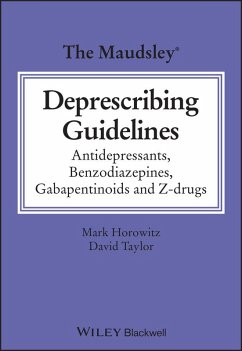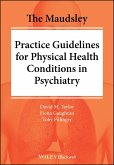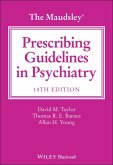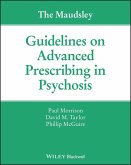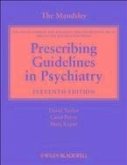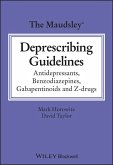The Maudsley¯® Deprescribing Guidelines Comprehensive resource describing guidelines for safely reducing or stopping (deprescribing) antidepressants, benzodiazepines, gabapentinoids and z-drugs for patients, including step-by-step guidance for all commonly used medications, covering common pitfalls, troubleshooting, supportive strategies, and more. Most formal guidance on psychiatric medication relates to starting or switching medications with minimal guidance on deprescribing medication. In 2023, the World Health Organisation and the United Nations called for patients, as a human right, to be informed of their right to discontinue treatment and to receive support to do so. The Maudsley Deprescribing Guidelines fills a significant gap in guidance for clinicians by providing comprehensive and authoritative information on this important aspect of treatment. This evidence-based handbook provides an overview of principles to be used in deprescribing. This is derived from fundamental scientific principles and the latest research on this topic, combined with emerging insights from clinical practice (including from patient experts). Building on the recognised brand of The Maudsley Prescribing Guidelines, and the prominence of the authors' work, including in The Lancet Psychiatry on tapering antidepressants (the most read article across all Lancet titles when it was released). The Maudsley Deprescribing Guidelines covers topics such as: * Why and when to deprescribe antidepressants, benzodiazepines, gabapentinoids and z-drugs * Barriers and enablers to deprescribing including physical dependence, social circumstances, and knowledge about the discontinuation process * Distinguishing withdrawal symptoms, such as poor mood, anxiety, insomnia, and a variety of physical symptoms from symptoms of the underlying disorder that medication was intended to treat * The difference between physical dependence and addiction/substance use disorder * Explanation of why and how to implement hyperbolic tapering in clinical practice * Specific guidance on formulations of medication and techniques for making gradual reductions, including using liquid forms of medication, and other approaches * Step-by-step guidance for safely stopping all commonly used antidepressants, benzodiazepines, gabapentinoids and z-drugs, including fast, moderate and slow tapering regimens or schedules for each drug, and guidance on how to tailor these to an individual * Troubleshooting issues which can arise on stopping these medications, including akathisia, withdrawal symptoms, acute or protracted, and relapse. Written for anyone interested in safe deprescribing of psychiatric medications including psychiatrists, GPs, pharmacists, nurses, medical trainees, and interested members of the public. The Maudsley Deprescribing Guidelines is an essential resource on the subject that provides practical guidance on how to improve patient outcomes in this field of medicine.
Dieser Download kann aus rechtlichen Gründen nur mit Rechnungsadresse in A, B, BG, CY, CZ, D, DK, EW, E, FIN, F, GR, HR, H, IRL, I, LT, L, LR, M, NL, PL, P, R, S, SLO, SK ausgeliefert werden.

